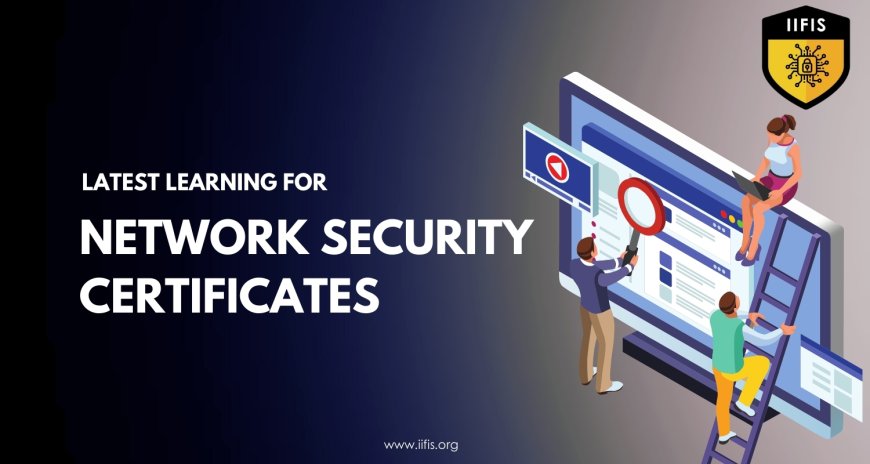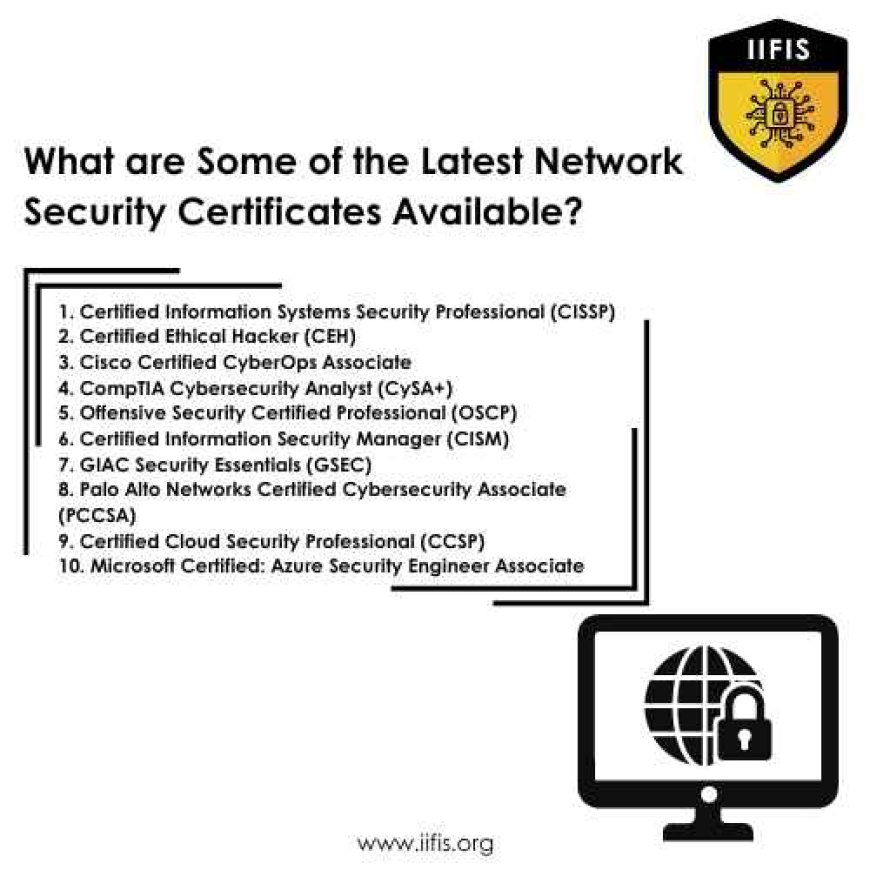Latest Learning for Network Security Certificates
Get updated on new techniques, certification courses, and best practices in network security to boost your cybersecurity skills

Network Security Certificate Programs are important for people who want to be good at keeping computer networks safe. These certificates show that you're good at what you do and help you learn more about keeping computer systems secure. Nowadays, with everything connected online, bad guys trying to break into computer systems are a big problem for companies. That's why there's a growing need for people who have certificates in network security. These people are better at stopping computer viruses, keeping important information safe, and making sure computer systems work well and aren't hacked.
Learning about computer security isn't just about stopping bad guys; it's also about understanding how computers work and how to fix problems. Certificates in Information Security help you learn about different ways to keep computers safe from all sorts of problems. It's also really important to keep up with the latest trends and new technologies in computer security. Network Security Certificate programs teach you about new things like cloud security, keeping smart devices safe, and how to spot and stop computer attacks. Getting a Network Security Certificate isn't just about getting a piece of paper. It's about learning how to make computer systems safer and protecting important information from hackers. By learning more and getting certificates, you can become good at keeping computer networks safe and helping companies stay secure online.
Getting Better at Network Security Certificates
Keeping information safe, people always want to stay ahead of new problems and technologies. Getting better at network security certificates isn't just something you do for work—it's really important. More and more jobs need people who are good at cybersecurity, so it's smart to get special certificates to show you know your stuff. Starting, it's crucial to build a strong base in security. Certificates like Certified Penetration Tester (CPT) and Cybersecurity Associate (CSA) are good starting points. They teach you the basics of finding problems in networks, testing them out, and figuring out how risky they are. These certificates give you a good start for a job in cybersecurity.
But getting good at this stuff doesn't stop with the basics. As problems get trickier, companies need experts who can handle them. That's where the Certified Cyber Security Manager (CCSM) certificate comes in. It teaches you advanced skills in planning, managing risks, and dealing with big security issues. With this certificate, you show you can lead projects, protect what's important to a company, and handle new problems as they come up. So, getting better at network security certificates means always learning and getting better. Whether you're starting with the basics or moving up to big management roles, it's important to keep up with what's happening in the industry and get the right certificates to show you're on top of things.
Finding the Right Network Security Certificate
keeping computer networks safe, getting the right network security certificate is super important. But figuring out which one to go for can be hard. Let's look at some of the big problems people face when they try to pick the best certificate:
1. Lots of Choices: There are tons of different certificates you can get, like CISSP, CEH, Cisco CyberOps, and CompTIA Security+. Each one focuses on different things, which can make it tough to decide.
2. Tech Keeps Changing: Computers and the internet are always getting better (and scarier!). Certificates need to keep up with all these changes, so it's hard to know which ones are still useful.
3. Matching Skills: Different certificates teach different skills, like how to defend networks or test them for weaknesses. You have to figure out which skills you need for your job and which certificate will give you those skills.
4. What Employers Want: Some jobs ask for specific certificates. But every company is different, so it's hard to know which certificates will impress them. And some companies care more about your experience than your certificates!
5. Money Matters: Getting a certificate costs a lot of money. You have to pay for the test, study materials, and maybe even classes. It's important to think about if getting the certificate will help you make more money later.
6. Time is Precious: Studying for a certificate takes a long time. You have to balance studying with your job and your family.
7. Keeping It Up: After you get a certificate, you might have to keep renewing it every few years. That means more studying and more tests!
Getting the right network security certificate is tricky, but if you do your research and talk to people who know about it, you can find the one that's right for you and your career.
Which network security certificates should I pursue in today's cybersecurity field?
In online security, it's important to have certifications that show you know your stuff. Two certificates that are valuable right now are the Certified Information Systems Security Professional (CISSP) and the Certified Ethical Hacker (CEH). CISSP proves you understand security basics well, while CEH focuses on offensive security tactics. Getting these certificates not only boosts your skills but also makes you more attractive to potential employers in the cybersecurity industry.

Exploring the Latest Trends in Network Security Certificates
In cybersecurity, it's crucial to keep up with the latest trends in network security certificates. These certificates show that professionals know how to keep computer networks safe from bad guys. Let's look at some important things to know about these certificates:
1. Bad Guys Are Getting Smarter: Cybercriminals are getting better at their jobs. So, companies need people with the latest certificates to help keep their networks safe from these tricky crooks.
2. Cloud Security is Big: More and more businesses are using cloud computing. So, certificates that focus on keeping cloud data safe, like AWS Certified Security - Specialty or Certified Cloud Security Professional (CCSP), are really important.
3. Zero Trust is the Way: The Zero Trust security model is becoming popular. It's all about being careful with who gets into a network and keeping an eye on them all the time. Certificates like Certified Zero Trust Architect (CZTA) show that professionals know how to set up and run these kinds of secure networks.
4. AI and Computers Working Together: Computers that can think for themselves (kind of) are being used more in network security. Certificates like Certified Information Security Manager (CISM) or CompTIA Security+ show that professionals know how to use these smart computers to keep networks safe.
5. Security is Part of Making Software: Making software and keeping it safe should go hand in hand. Certificates like Certified DevSecOps Engineer (CDSE) show that professionals know how to build software with security in mind from the start.
6. Following the Rules: There are lots of rules about keeping data safe. Certificates about following these rules, like GDPR or HIPAA, show that professionals know how to keep data safe and follow the rules about it.
Keeping up with the latest stuff in network security is important these days. With cyber threats getting fancier all the time, it's crucial to know all the newest tricks and tech to keep data safe and networks working right. Getting certificates that show you're up-to-date not only helps you learn more but also shows you're serious about doing a great job in network security. Learning all the time means you'll stay ahead in the field, ready to handle any new dangers that pop up in cybersecurity.
























